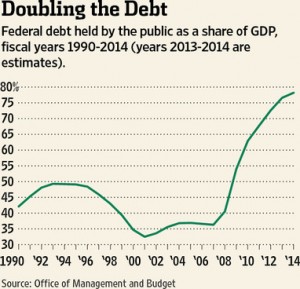As of April 29, the U.S. government will have operated without a budget for four years. Based on the budget he proposed this week, President Obama intends to keep the streak going.
Even the smallest mom-and-pop businesses develop a budget each year and stick to it. Yet the world’s largest enterprise – the U.S. government – has operated without a budget for more than 1,400 days. Of course, the mom-and-pop business wouldn’t spend $1.4 trillion more than it takes in every year, either, but that’s another matter.
Nitpickers would say that the government is operating with a budget; Congress just has not passed a budget resolution since 2009. But it’s the job of Congress to pass and approve a budget – and it has not done so for four years.
As just one example of the absurdity of the Congressional budget process in recent years, consider that when President Obama proposed his budget for FY ’12, the Senate voted it down 97–0. Every Senator in the President’s own party – even Senate Majority Leader Harry Reid — voted against the budget, even though many had praised it when it was proposed.
Deficit Reduction?
The U.S. Senate passed its first budget in four years in March, but it has as much chance of passing in the House as the House-approved budget, also approved in March, has of passing in the Senate.
Then there’s President Obama’s latest budget proposal, a $3.77 trillion budget which the White House says would cut deficits by $1.8 trillion over the next decade.
Does that mean that White House budget would cut the current debt of $16.8 trillion to $15 trillion 10 years from now? Of course not!
What the White House is saying is that if the proposed budget were approved (which it won’t be), the projected rate of growth in the federal debt will be $1.8 trillion lower than it otherwise would be.
Unsequestration
Of course, even with that caveat, the $1.8 trillion projection is really a $700 billion reduction, because, among other things, the new budget would undo the sequestration budget cuts, restoring what President Obama called “the foolish across-the-board spending cuts that are already hurting our economy.”
So, if sequestration had not taken place last month, presumably the economy would be booming this month, even though it has been growing at less than 2% a year since the recession ended.
You may recall the angst produced in Washington by those brutal sequestration cuts, which amount to 1.2% of the budget. While sequestration produced an $85 billion budget cut, everything in Washington gets pushed off as long as possible, so only $44 billion In actual cuts are scheduled taking place in 2013.
Still, that cut was enough to result in furloughs for border patrol agents, the docking of aircraft carriers and the grounding of Air Force combat squadrons, not to mention cancelation of White House tours.
Items still in the budget, though, include more than $700,000 for gardening services at the U.S. NATO Ambassador’s resident in Brussels, $100,000 for walking the First Dog and $221,000 for three calligraphers on the White House staff.
There are also new spending initiatives, including funding for high-speed rail, battery operated cars and more. Higher taxes on tobacco would supposedly pay for public pre-school education, so if you want to help your children get ahead, take up smoking.
Another Tax Increase
Speaking of taxes, the budget proposal includes about $1 trillion of those, including an increase in the estate tax.
The government would also collect an additional $124 billion over 10 years because of a tweak in the way Social Security payments are indexed for inflation. This particular “entitlement reform” is getting the bulk of the media attention, but, given the tens of trillions of dollars in unfunded Social Security liabilities, it’s like trying to stop a runaway train with a fly swatter.
According to the U.S. Office of Management and Budget, the federal debt as a share of gross domestic product (GDP) was under 33% as recently as 2001, but will reach 78% in 2014.
Belt tightening is indeed taking place, but not in Washington, where Congress is apparently too ashamed to pass a budget that backs its reckless level of spending.
